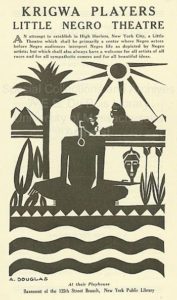
*This March (National Theater Month), 1925, we celebrate the Krigwa Players.
Also known as the Krigwa Players Little Negro Theatre and named for the acronym CRIGWA: Crisis Guild of Writers and Artists) was one of the most prominent and popular theatre groups based out of Harlem during the Harlem Renaissance. Though it only lasted three years, The Krigwa Players' impact was felt throughout Harlem and the cities where it spawned offshoot projects into Cleveland, Baltimore, Washington, D.C., and Philadelphia.
It was founded in 1925 by W.E.B. Du Bois and Regina Anderson, with Du Bois serving as the chairman of the theater group entirely. The theatre was converted from the basement of the 135th Street Harlem Library. The company aimed to create, nurture, develop, and promote new writers, directors, performers, and actors within the black community. In 1924, Amy Spingarn (wife of Joel Elias Spingarn) established an annual literary contest in The Crisis. Accepting submissions for fiction, essays, verse, and plays, this contest became the primary source of new work for the Krigwa Players.
The company became sharply split after the tournament. Du Bois used the prize money to pay for the cost of the production and enter the tournament with no money going toward the performers. After this, the company parted and went their separate ways. According to Eulalie Spence, the last official production of the Krigwa Players was Fool's Errand. Another group named Krigwa Players emerged in 1928 but was not affiliated with The Crisis or the original Krigwa Players. The theater's legacy led to subsequent groups filling the space after its closure, some being the Negro Experimental Players (1929), the Harlem Players (1931), and the American Negro Theater, which lasted nine years. It ran the longest out of all the former theater companies.